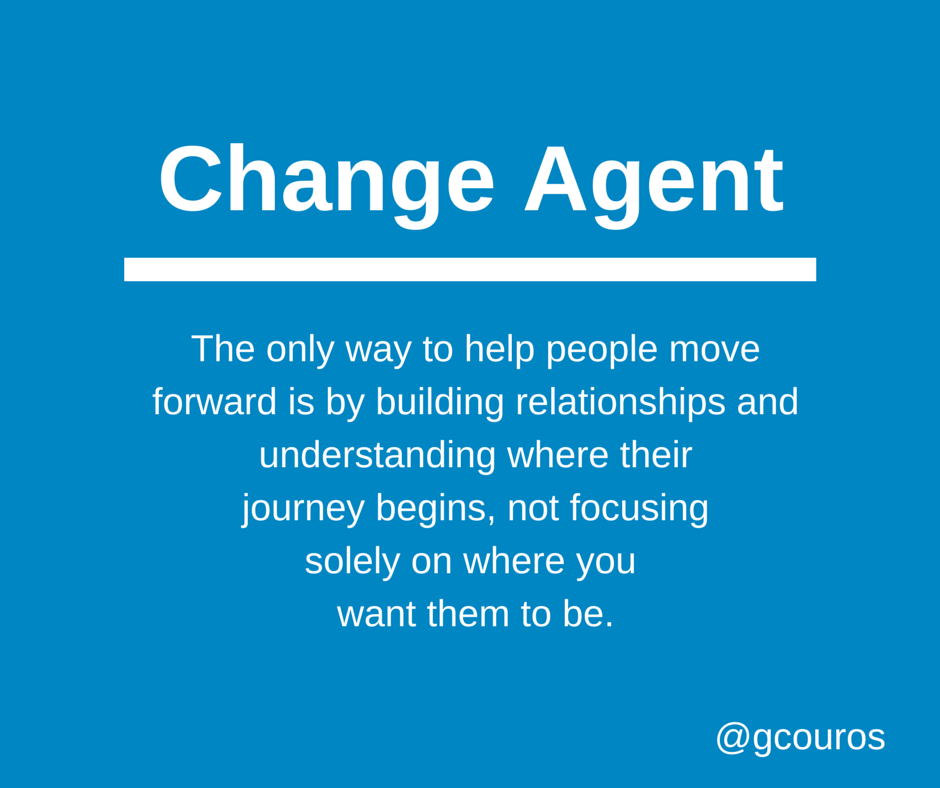
In 2013, I wrote an article about the “5 Characteristics of a Change Agent”, with the characteristics and descriptions below:
1. Clear Vision – A “change agent” does not have to be the person in authority, but they do however have to have a clear vision and be able to communicate that clearly with others. Where people can be frustrated is if they feel that someone is all over the place on what they see as important and tend to change their vision often. This will scare away others as they are not sure when they are on a sinking ship and start to looking for ways out. It is essential to note that a clear vision does not mean that there is one way to do things; in fact, it is essential to tap into the strengths of the people you work with and help them see that there are many ways to work toward a common purpose.
2. Patient yet persistent – Change does not happen overnight and most people know that. To have sustainable change that is meaningful to people, it is something that they will have to embrace and see importance. Most people need to experience something before they really understand that, and that is especially true in schools. With that being said, many can get frustrated that change does not happen fast enough and they tend to push people further away from the vision, then closer. The persistence comes in that you will take opportunities to help people get a step closer often when they are ready, not just giving up on them after the first try. I have said continuously that schools have to move people from their point ‘A’ to their point ‘B’, not have everyone move at the same pace. Every step forward is a step closer to a goal; change agents just help to make sure that people are moving ahead.
3. Asks tough questions – It would be easy for someone to come in and tell you how things should be, but again that is someone else’s solution. When that solution is someone else’s, there is no accountability to see it through. It is when people feel an emotional connection to something is when they will truly move ahead. Asking questions focusing on, “What is best for kids?”, and helping people come to their own conclusions based on their experience is when you will see people have ownership in what they are doing. Keep asking questions to help people think, don’t alleviate that by telling them what to do.
4. Knowledgeable and leads by example – Stephen Covey talked about the notion that leaders have “character and credibility”; they are not just seen as good people but that they are also knowledgeable in what they are speaking about. Too many times, educators feel like their administrators have “lost touch” with what is happening in the classroom, and many times they are right. Someone who stays active in not necessarily teaching, but active in learning and working with learners and can show by example what learning can look like now will have much more credibility with others. If you want to create “change”, you have to not only be able to articulate what that looks like, but show it to others. I have sat frustrated often listening to many talk about “how kids learn today” but upon closer look, the same speakers do not put themselves in the situation where they are actually immersing themselves in that type of learning. How can you really know how “kids learn” or if something works if you have never experienced it?
5. Strong relationships built on trust – All of the above, means nothing if you do not have solid relationships with the people that you serve. People will not want to grow if they do not trust the person that is pushing the change. The change agents I have seen are extremely approachable and reliable. You should never be afraid to approach that individual based on their “authority” and usually they will go out of their way to connect with you.
What is most important about all of these characteristics, is the last point on relationships. There is a difference between a “change agent” and a “change advocate”. If you hold the first four qualities on this list only, you are someone advocating for change, but not necessarily making it happen. All the vision and knowledge in the world means nothing if we are not able to connect with others; it is the equivalent of shouting into the wind. Having the fifth quality focused on relationships, is what makes someone a “change agent”. The only way to help people move forward is by building relationships and understanding where their journey begins, not focusing solely on where you want them to be.